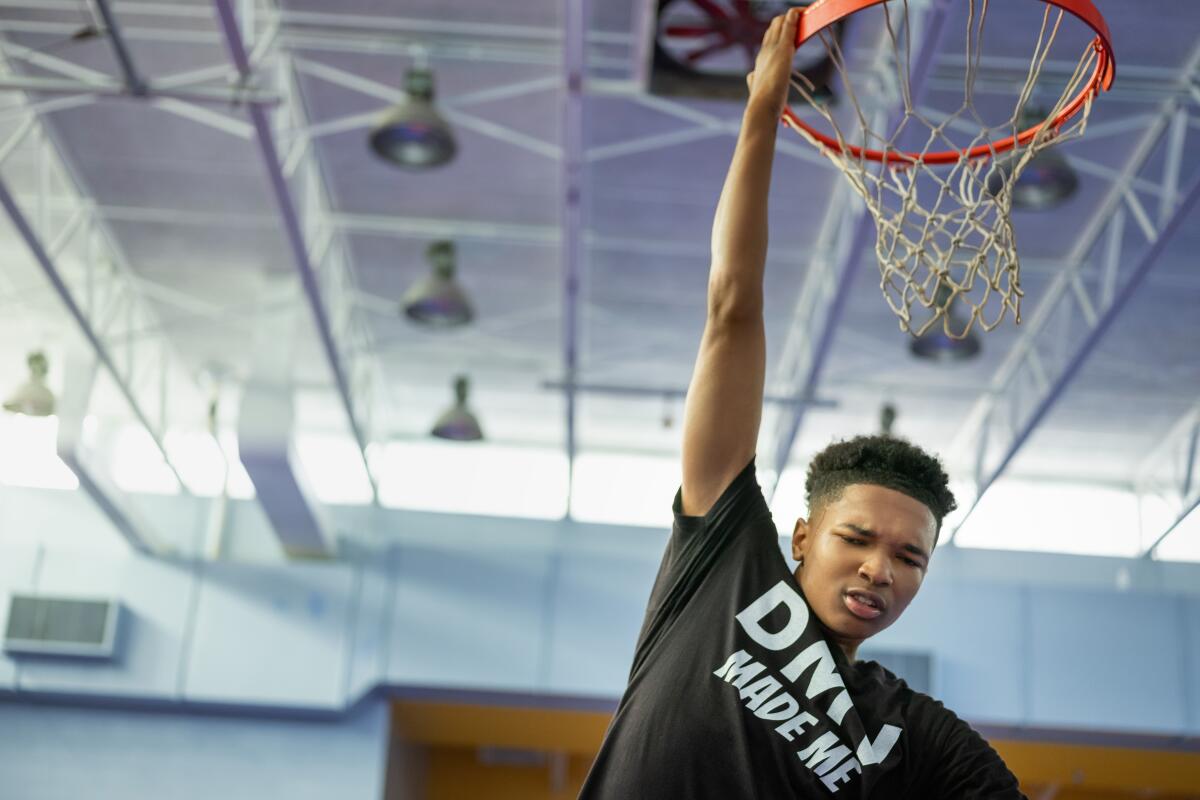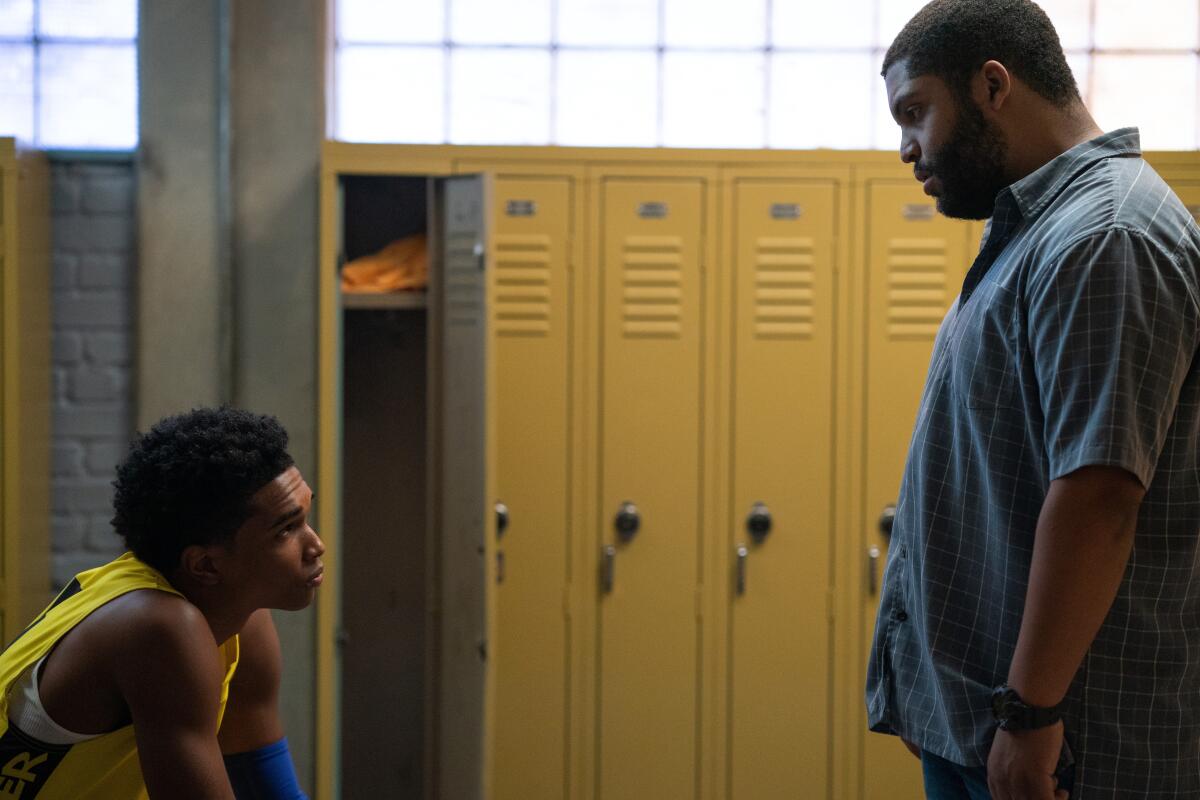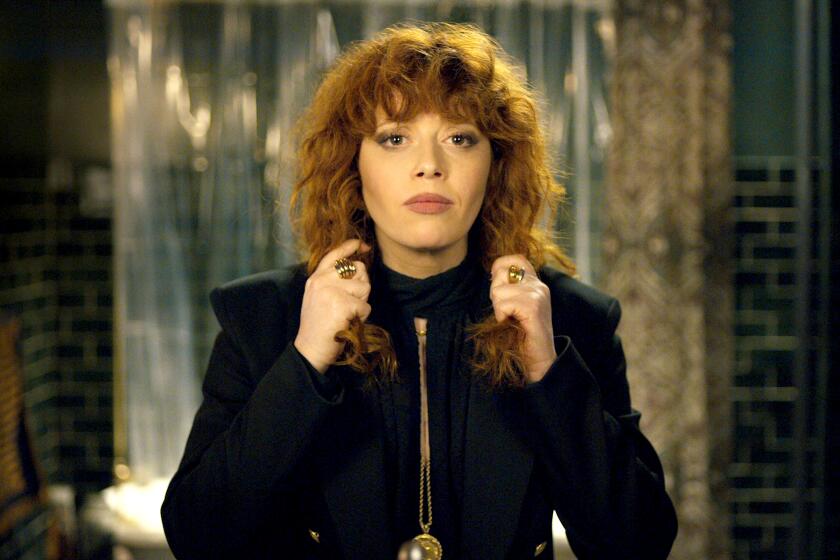‘Sacrilegious’? Maybe. But this new basketball drama is the next ‘Friday Night Lights’

- Share via
Aspiring hoops phenom Jace Carson is already a hero in his hometown, and word of his dazzling prowess on the court is spreading. He already feels that scoring a spot on an NBA team is like his signature shot — a slam dunk. He’s already visualizing being able to afford not just one, but three, lavender Lexuses for his mother.
He still has several years to wait before he can realize his dream, though: Jace is in the eighth grade.
As for legions of Black youths his age, the seductive lure of professional basketball offers not only a shot at stardom, but a ticket out of financial hardships and communities underserved — and in some cases actively mistreated — by educators, healthcare providers, politicians and police.
Jace’s journey is at the core of “Swagger,” a new Apple TV+ drama set in the fiercely competitive world of youth basketball. The 10-episode series, which premiered last month, notched favorable notices from critics and cultural commentators, including the Black List founder Franklin Leonard. Some have even compared it to “Friday Night Lights,” NBC’s acclaimed drama about a high school football team.
The complete guide to home viewing
Get Screen Gab for everything about the TV shows and streaming movies everyone’s talking about.
You may occasionally receive promotional content from the Los Angeles Times.
Like that beloved series, which premiered in 2006 and lasted five seasons, “Swagger” has much more on its agenda than the thrill of victory and the agony of defeat. Fractured Black families, racism, sexual misconduct, the overwhelming impact of social media and the lucrative intrusion by major sporting goods companies into youth athletics are among the themes explored.
It’s also a story about redemption, as illustrated by the struggles of Isaac Kennedy Edwards, a.k.a. “Icon,” a former championship player whose path to greatness was derailed. Barely holding it together with a meager job and a baby on the way, Edwards is seeking his own salvation while also trying to steer his talented young players, including Jace, away from temptations that could knock them off track.
“It’s a basketball show that’s not really about basketball,” said creator Reggie Rock Bythewood (“Get on the Bus,” “Shots Fired”). “It’s about growing up in America.”
The show stars O’Shea Jackson Jr. as Icon, Isaiah Hill as Jace and Oscar nominee Quvenzhané Wallis (“Beasts of the Southern Wild”) as Crystal, a young basketball star who becomes increasingly traumatized by what she feels are inappropriate advances by her coach.

“Swagger” is inspired by NBA star and executive producer Kevin Durant‘s own experiences playing youth basketball.
“Sports are a reflection of life, and there’s so much kids can learn about teamwork and getting better at your craft from youth basketball.” Durant wrote in an email to The Times. “At the same time, it’s a business, and there’s a lot of pressure to compete. There’s obviously a lot of similarities between Jace’s story and mine, from leading his team to his relationship with his mom. But he and the other characters have real stories of their own, and they go through what we all went through in the last year with the pandemic and more.”
In a Zoom interview, Bythewood — husband of Gina Prince-Bythewood, writer and director of “Love & Basketball” and a consulting producer on “Swagger” — talked about his initial reluctance about the project, his dedication to authenticity and what he hopes viewers get from the series.
We surveyed The Times TV team to come up with a list of the 75 best TV shows you can watch on Netflix. As in, tonight.
What brought you to “Swagger?”
K.D. and [executive producer] Brian Grazer were talking a few years ago during a conference in Italy about doing a show inspired by his youth basketball days. I was asked to meet with Kevin, who was still with Golden State at the time. I was reluctant. I wasn’t looking to do anything in the basketball arena — that is sort of sacrilegious in this household. [Laughs.] But there’s worse things in the world than meeting Kevin Durant, who is arguably the best player in the world. I flew to Oakland, to his house, and he was this humble, inviting, generous person. We started talking about life, and I immediately got him.
What impressed you?
I was taken by the fact that at 13 or 14 years old, he still had to prove himself. He was not this phenom that everybody knew was going to be what he arrived at eventually. He was taller than the other kids. He had a coach that taught him to be a ball handler, working on elements of the game that helped elevate him to where he is now. I thought it was a great launchpad for a series. I also wanted to bring in elements of my own life, being the parent of two kids that play sports and seeing some great coaches. I’ve also seen coaches that know the sport but don’t know how to deal with kids. On this show, we see the pressures that these young people are under before they even get into college or high school.
You’re also dealing with the troubles of adults, especially Icon, who was a star before everything crashed and burned.
Some people are killers at the high school or college level. Icon was touted as the top high-school player. But he succumbed to some pressures and made some choices that helped him fall from grace. Emotionally, he was not the best version of himself. The reality is he needs Jace as much as Jace needs him.
The basketball scenes and camerawork are really impressive. We’re right inside the game.
It was important to me to shoot the basketball action in a way we haven’t seen before. One of our main objectives is that we would see players really make the shots. There’s no cutaways where you see the shot beginning and the ball going through the hoop in another shot. A lot of basketball films lower the rim to eight or nine feet. You can smell it when that happens. We have players who had never acted that really worked hard on their acting, and actors who worked very hard to improve their ball skills.
What do you hope audiences understand about what “Swagger” represents?
So often that word, “swagger,” is about bravado or machismo. But in our show, “swagger” is about having a cause bigger than yourself, whether it’s family, community or your team. It’s that cause that gives you that intestinal fortitude to prevail.
‘Swagger’
Where: Apple TV+
When: Anytime
Rating: TV-14 (may be unsuitable for children under the age of 14)
More to Read
The complete guide to home viewing
Get Screen Gab for everything about the TV shows and streaming movies everyone’s talking about.
You may occasionally receive promotional content from the Los Angeles Times.








